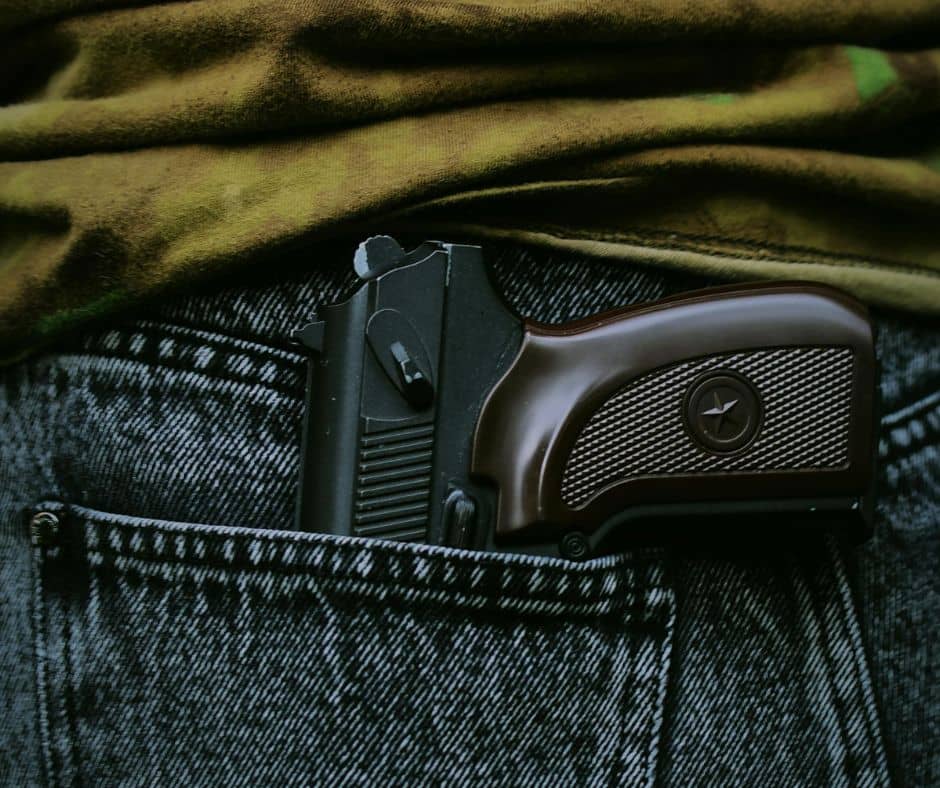What’s the Difference Between Open and Concealed Carry?

For many North Carolina residents, the right to bear arms is an important constitutional freedom. With the uptick in crime we’ve seen lately, more people are interested in carrying firearms for self-defense.
But should you open carry or conceal carry your weapon? There are some key differences you need to understand.
As your experienced North Carolina weapon charges lawyer, we’re often asked about the pros, cons, and legalities of open vs. concealed carry in NC. There’s a lot of confusion, so let’s break it down.
First, What Exactly is Open Carry?
Open carry simply means openly carrying a firearm in public. The gun must be clearly visible, often in a holster on your hip or shoulder.
With open carry, your firearm is out in the open for all to see. You don’t need a permit in North Carolina as long as you’re legally allowed to possess the gun.
Now, just because it’s legal doesn’t mean you can walk around brandishing a firearm wherever you please. There are some restrictions.
Where Can You Legally Open Carry in North Carolina?
North Carolina is an open carry state. You can openly carry any legal firearm as long as you’re at least 18 years old. However, some areas prohibit open carry:
- Educational property – It’s illegal to open carry on any school campus or at a school-sponsored event.
- Government buildings – You can’t open carry in federal buildings like post offices or Social Security offices. State and local government buildings may also prohibit firearms.
- Public demonstrations – It’s illegal to open carry at an organized protest, rally, parade, or other public demonstration.
Local governments can also implement additional restrictions on open carry. And private businesses may ban open carry on their property if they wish.
So make sure you know the laws before strapping on that pistol!
Weighing the Pros and Cons of Open Carry
Why might someone choose open over concealed carry? There are a few potential benefits:
- Quick access – With open carry, your firearm is right there on your hip, ready for quick access if needed. You don’t have to lift a shirt or jacket to draw the weapon. Those extra seconds could make a difference in an emergency situation.
- Visibility as a deterrent – Some argue that openly carrying a firearm deters potential criminals. The visible presence of a firearm signals you are equipped to defend yourself and not an easy target.
However, there are also some downsides to consider with open carry:
- Public discomfort – Many people are intimidated by seeing guns openly carried in public places. It can make some folks uneasy, even if it’s legal.
- Risk of hostility – Openly carrying may attract unwanted attention and hostility in certain situations or locations. You could become a target instead of deterring threats.
- Accidental display – Open carry makes it more likely your gun will be seen by children or accidentally displayed. This could lead to unnecessary 911 calls or other issues.
So, while open carry has its benefits, there are also reasons you may prefer to conceal carry.
What is Concealed Carry?
With concealed carry, you’re keeping your firearm hidden from public view. Your gun is concealed either:
- On your person underneath clothing, such as under a shirt or jacket
- In a bag, purse, or backpack
- In an appendix or shoulder holster under a cover garment
The key distinction is that others around you are unaware you have a firearm.
Is a Permit Required for Concealed Carry in North Carolina?
North Carolina is a “shall issue” state for concealed carry permits. That means the sheriff must issue a permit to any applicant who meets the legal requirements.
Here are the eligibility criteria:
- Be at least 21 years old
- Complete an approved firearms safety and training course
- Have lived in NC as a resident for 30+ days
- Be a U.S. citizen or lawful permanent resident
- Have no disqualifying criminal convictions
- Have no mental or physical disabilities preventing safe firearms handling
The cost of the permit is typically around $80 – $90, and it’s valid for 5 years.
With the permit, you can carry a concealed handgun anywhere in North Carolina except for areas specifically prohibited by law.
Where Can You Not Carry a Concealed Weapon in North Carolina?
While a concealed carry permit grants broad privileges, there are some off-limit locations, including:
- Schools – It’s illegal to conceal carry at any public or private school, on educational property, or at school-sponsored events.
- Government buildings – No concealed weapons allowed in federal buildings, courthouses, law enforcement offices, correctional facilities, or other government offices.
- Public demonstrations – You can’t conceal carry at organized protests, rallies, picket lines, or other public demonstrations.
- Private property – You must comply if a private business or other property owner bans concealed weapons.
Concealed carry may also be prohibited in certain public recreation areas, restaurants serving alcohol, parades, funeral processions, and more.
The Pros and Cons of Concealed Carry
Why might someone prefer concealed over open carry? A few of the main advantages include:
- Keeps your gun hidden – Concealed carry allows you to keep your firearm private and unseen by others around you.
- Avoids public discomfort – Since the gun is out of sight, concealed carry prevents the uneasiness some feel seeing a weapon openly displayed.
- Retains tactical element of surprise – If needed for self-defense, a hidden weapon could give you an advantage over a criminal threat.
However, there are also some potential disadvantages with concealed carry:
- Slower access to weapon – Drawing a concealed firearm typically takes longer than drawing from an open carry holster.
- Not a visible deterrent to criminals – Since the gun is hidden, concealed carry does not provide the same visual crime deterrent effect.
- Clothing challenges – Finding garments to properly conceal your firearm takes forethought. Certain styles of clothing won’t work well.
So, in considering open vs. concealed carry, you can see there are valid pros and cons to each method. There is no definitively “superior” approach – it depends on your needs and preferences.
Key Differences Between Open and Concealed Carry in North Carolina
To summarize the main differences:
- Visibility – Open carry allows immediate visibility of your firearm to others, while concealed carry keeps your weapon hidden.
- Accessibility – Open carry allows faster access to draw your weapon compared to concealed carry.
- Public perception – Open carry may make some members of the public uncomfortable, while concealed carry avoids this issue.
- Legal restrictions – North Carolina requires a permit for concealed carry but not for open carry. However, some locations may restrict open carry.
- Tactical considerations – Open carry offers a visual crime deterrent, while concealed carry provides the element of surprise if needed for defense.
As we’ve illustrated, there are compelling reasons to consider both open and concealed carry. There is no one-size-fits-all approach. Factors like your lifestyle, wardrobe, community perceptions, and personal comfort level should influence your decision.
Should You Open Carry or Conceal Carry Your Firearm?
As your North Carolina criminal defense attorneys, we recommend carefully weighing both open and concealed carry. Understand the laws in your jurisdiction, get proper training, and practice responsible firearms handling no matter how you choose to carry.
It’s also smart to have a lawyer on your side. We can advise you on the best legal strategy and defense if you ever use your weapon in self-defense.
Don’t take chances with your rights. If you have any questions or concerns around open vs. concealed carry in North Carolina, reach out to us for a case review. We’re here to help – contact McMinn, Logan & Gray PLLC.
